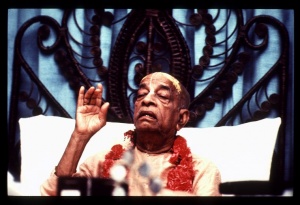BG 16.6: Difference between revisions
m (1 revision(s)) |
No edit summary |
||
| Line 1: | Line 1: | ||
{{ | [[Category:Bhagavad-gita As It Is (1983+) - Chapter 16|b06]] | ||
<div style="float:left">'''[[Bhagavad-gita As It Is (1983+)]] - [[BG 16 (1983+)|Chapter 16: The Divine And Demoniac Natures]]'''</div> | |||
<div style="float:right">[[File:Go-previous.png|link=BG 16.5]] '''[[BG 16.5]] - [[BG 16.7]]''' [[File:Go-next.png|link=BG 16.7]]</div> | |||
{{CompareVersions|BG|16.6|BG 1972|BG 1983+}} | |||
{{RandomImage}} | |||
==== TEXT 6 ==== | ====TEXT 6 ==== | ||
<div class="devanagari"> | |||
:द्वौ भूतसर्गौ लोकेऽस्मिन्दैव आसुर एव च । | |||
:दैवो विस्तरशः प्रोक्त आसुरं पार्थ मे शृणु ॥६॥ | |||
</div> | |||
<div | <div class="verse"> | ||
:dvau bhūta-sargau loke 'smin | |||
:daiva āsura eva ca | |||
:daivo vistaraśaḥ prokta | |||
:āsuraṁ pārtha me śṛṇu | |||
</div> | </div> | ||
==== SYNONYMS ==== | ==== SYNONYMS ==== | ||
<div class="synonyms"> | |||
<div | ''dvau''—two; ''bhūta-sargau''—created living beings; ''loke''—in the world; ''asmin''—this; ''daivaḥ''—godly; ''āsuraḥ''—demoniac; ''eva''—certainly; ''ca''—and; ''daivaḥ''—the divine; ''vistaraśaḥ''—at great length; ''proktaḥ''—said; ''āsuram''—the demoniac; ''pārtha''—O son of Pṛthā; ''me''—from Me; ''śṛṇu''—just hear. | ||
</div> | </div> | ||
==== TRANSLATION ==== | ==== TRANSLATION ==== | ||
<div class="translation"> | |||
<div | |||
O son of Pṛthā, in this world there are two kinds of created beings. One is called the divine and the other demoniac. I have already explained to you at length the divine qualities. Now hear from Me of the demoniac. | O son of Pṛthā, in this world there are two kinds of created beings. One is called the divine and the other demoniac. I have already explained to you at length the divine qualities. Now hear from Me of the demoniac. | ||
</div> | </div> | ||
==== PURPORT ==== | |||
= | <div class="purport"> | ||
Lord Kṛṣṇa, having assured Arjuna that he was born with the divine qualities, is now describing the demoniac way. The conditioned living entities are divided into two classes in this world. Those who are born with divine qualities follow a regulated life; that is to say they abide by the injunctions in scriptures and by the authorities. One should perform duties in the light of authoritative scripture. This mentality is called divine. One who does not follow the regulative principles as they are laid down in the scriptures and who acts according to his whims is called demoniac or asuric. There is no other criterion but obedience to the regulative principles of scriptures. It is mentioned in Vedic literature that both the demigods and the demons are born of the Prajāpati; the only difference is that one class obeys the Vedic injunctions and the other does not. | |||
</div> | |||
<div | <div style="float:right; clear:both;">[[File:Go-previous.png|link=BG 16.5]] '''[[BG 16.5]] - [[BG 16.7]]''' [[File:Go-next.png|link=BG 16.7]]</div> | ||
__NOTOC__ | |||
</div> | __NOEDITSECTION__ | ||
__NOTOC__ | |||
Revision as of 16:25, 14 December 2017

A.C. Bhaktivedanta Swami Prabhupada
TEXT 6
- द्वौ भूतसर्गौ लोकेऽस्मिन्दैव आसुर एव च ।
- दैवो विस्तरशः प्रोक्त आसुरं पार्थ मे शृणु ॥६॥
- dvau bhūta-sargau loke 'smin
- daiva āsura eva ca
- daivo vistaraśaḥ prokta
- āsuraṁ pārtha me śṛṇu
SYNONYMS
dvau—two; bhūta-sargau—created living beings; loke—in the world; asmin—this; daivaḥ—godly; āsuraḥ—demoniac; eva—certainly; ca—and; daivaḥ—the divine; vistaraśaḥ—at great length; proktaḥ—said; āsuram—the demoniac; pārtha—O son of Pṛthā; me—from Me; śṛṇu—just hear.
TRANSLATION
O son of Pṛthā, in this world there are two kinds of created beings. One is called the divine and the other demoniac. I have already explained to you at length the divine qualities. Now hear from Me of the demoniac.
PURPORT
Lord Kṛṣṇa, having assured Arjuna that he was born with the divine qualities, is now describing the demoniac way. The conditioned living entities are divided into two classes in this world. Those who are born with divine qualities follow a regulated life; that is to say they abide by the injunctions in scriptures and by the authorities. One should perform duties in the light of authoritative scripture. This mentality is called divine. One who does not follow the regulative principles as they are laid down in the scriptures and who acts according to his whims is called demoniac or asuric. There is no other criterion but obedience to the regulative principles of scriptures. It is mentioned in Vedic literature that both the demigods and the demons are born of the Prajāpati; the only difference is that one class obeys the Vedic injunctions and the other does not.